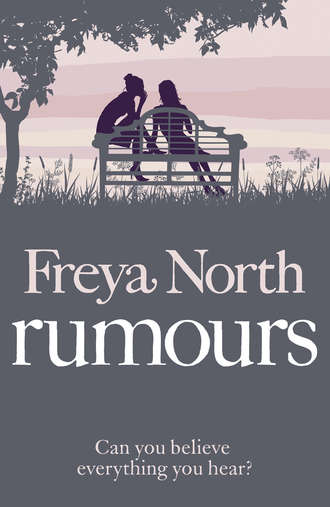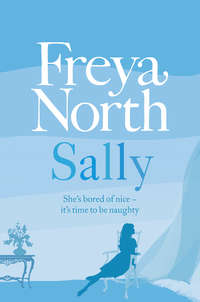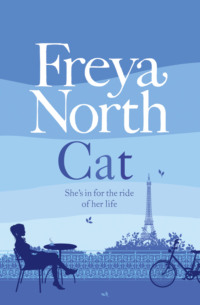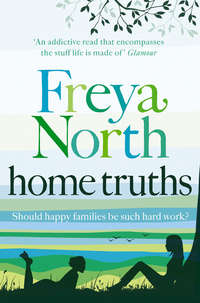
Полная версия
Rumours
‘No, thanks,’ said Stella.
They looked at her with For Heaven’s Sake, Why Not? written across their faces.
She shrugged.
‘Not ready?’ Juliet said softly.
‘Not interested,’ said Stella. ‘I’m fine as I am.’
‘For the time being?’ Sandie asked her daughter, a gentle pleading edging her question like garnish.
‘For the time being,’ Stella said. ‘Did any of you watch that new serial on the Beeb on Friday?’
‘About Rembrandt?’
‘With Kevin Branagh?’ said Sandie.
‘Kenneth,’ said everyone else.
‘Yes,’ said Stella.
‘We did.’
‘Us too.’
‘Wasn’t it brilliant?’
‘You and your Rembrandt,’ Sandie said. ‘She wrote her thesis on Rembrandt, you know. She got a first.’
They all knew that, and they all knew Sandie should be allowed to proclaim the fact as often as she liked.
* * *
Stella found Alistair, later on, out in the garage with all the children – including the teenage Twins – looking on in awe as he set his Hornby model railway into action. She watched alongside them for a while, transfixed by the little trees she’d made for him when she was a kid, remembering again the smell of the particular green paint she’d dipped the tiny torn pieces of sponge into. Remembering how they’d dried them on an old cake rack before painstakingly securing them onto matchstick trunks – her first use of Super Glue, her eldest brother coaching her, encouraging her, trusting her.
‘Alistair?’ Reluctantly, he looked up from controlling the points. ‘Here.’ She passed him a brown envelope.
‘What’s this?’
‘My rent, silly,’ she said.
‘Oh.’ He looked at the envelope as if he dreaded the contents.
‘This month and last.’
‘Stella – it’s fine, you know. Juliet and I both say – it’s fine.’
Stella shook her head decisively. ‘No way. It’s your house – and you have done me the most almighty favour in letting me live there for this amount. I know what the true rental value is, you know. My new job, Alistair – it’s a lifesaver. I can make ends meet – with commission, I might even be able to tie them in a bow.’
He continued to look at the envelope. ‘Charlie?’ he asked, very quietly, glancing at Will who was engrossed in Sir Nigel Gresley belting along the tiny track trying to catch up with the Flying Scotsman.
Stella shook her head.
‘No news?’
She shook her head again.
Alistair said Bastard under his breath, not so much for Stella’s sake, but for his own.
‘Please,’ he held the envelope out to her.
‘No, thanks,’ she said. She pushed her hands defiantly into her pockets, and she placed her head gently against her brother’s shoulder. She looked forward to the day when those close to her were no longer irked by Charlie.
Chapter Four
3 Lime Grove Cottages
Tramfield Lane
Long Dansbury
Herts
Monday
Dear Lydia
I hope this finds you in good health and high spirits. I took in the view of Longbridge Hall on my early morning run – the rain had lifted, a soft mist rolled quietly just above ground level, a glint of sunshine, a hint of spring – it really was a wonderful sight. Did you know there’s an extremely nice new Belgian patisserie recently opened in Ware? How about I treat you – or perhaps a bite of lunch at Hanbury Manor? Or just a stroll around Hatfield House? Audrey and Bert send their best – and I send my fondest.
Xander
Lady Lydia Fortescue read the letter twice. First with a smile, then with her customary wry consternation. A Belgian patisserie? In Ware? Was the boy forgetting Longbridge’s own Mrs Biggins whose scones and Victoria sponge and shortbread were legendary? Why buy foreign, dear God? And lunch at Hanbury Manor – preposterous! Rumour had it that New Money went there, and frightful Hen Party girls lolled around the place at weekends. Apparently, the hotel now had one of those gym places where men and women wore ridiculous get-ups and sweated and grunted alongside each other like toiling workhorses. A walk at Hatfield? During public opening hours? Paying for the privilege when she’d often been there as a guest of the Salisburys? And he’d written ‘Audrey and Bert’ – as if, had he just said ‘my parents’, she might be prone to have forgotten who they were.
Lydia laughed – a little staccato rush of air through her nostrils. Dear Xander. She would love to see the boy. How long had it been? A month? Six weeks? Atrocious! She walked from the drawing room through the staircase hall and across the entrance hallway over to the library. At the writing bureau, she sat and rummaged through the chaotic upper drawer for one of her heavy, watermarked, monogrammed cards.
Longbridge Hall
Long Dansbury
Hertfordshire
Wednesday
My dear Xander,
A treat to hear from you. Delighted to have provided an aesthetic backdrop to your athletic endeavours. I must decline the foreign bakery, and the public liability of Hanbury or Hatfield. But do come to tea at Longbridge, dear. Shall we say Saturday next – at half past three?
Yours,
Lydia F
Rifling through another drawer, becoming a little sidetracked by a clutch of old thank-you cards sent to her after some dinner party or other an age ago, Lydia found a sheet of second-class stamps. And then she came across the estimate for the roof repairs which she’d hidden on purpose months ago. She glanced at the columns of figures – the grand total – and cast her eyes to the heavens. Only, the ceiling was in the way and, taunting her, the yellow watermark ominously circumnavigating the cracked plaster of the ceiling rose. She buried the paperwork in an ancient copy of Country Life and set off for the postbox outside the village shop.
As Lydia walked back, she chided herself for not taking the car because she was undeniably tired. And silly – it wasn’t as if anyone would judge her, not at her age, not that she was remotely concerned with what anyone thought anyway. The driveway seemed to be so long these days and when did it develop this incline? Underfoot felt hard, uneven, despite her wearing her most comfortable slip-ons. She laughed – recalling a time when she refused to even glance at comfortable shoes, let alone buy them and wear them out in public.
Finally, she was home. And then she realized she’d forgotten her keys. No use knocking, it was Mrs Biggins’ day off. She went to the side of the house knowing the back door was unlocked because it was so tricky to lock that they’d given up years ago and just used the bolts, but she doubted it was bolted because Mrs Biggins wasn’t tall enough to shunt the topmost one across, and both she and her housekeeper were now old enough to eschew using anything one had to climb upon in order to reach something.
There were seven stone steps leading down to the door and, through the frosted glass pane, Lydia could see the comforting welcome of the lights she’d accidentally left on in the house. Down one step, two – it was really quite chilly. Three, four, five. Finally! Six and –
She fell. She wasn’t sure why. It didn’t matter why. But her shoulder bore the brunt and she took a knock to the side of her face too. It hurt, of course it hurt. But more significant than the pain was the shock. She felt frightened and that appalled her.
Mrs Biggins, damn you and your day off! Lydia stayed still for a few minutes. Was anything broken? She’d fractured various bones in hunting accidents over the years – no, she didn’t think so. Still, she felt most unsure about picking herself up. Her cheekbone was throbbing and her fingers were numb.
Hullo? Is anyone home? What a stupid question – why would there be? Mrs Biggins was probably in Bishop’s Stortford with her daughter. Mercifully, the door was indeed unlocked and Lydia finally made her way shakily inside. She checked her reflection and noted a red mark on the apple of her cheek, growing darker. Frozen peas, she thought, going into the kitchen. And then the lights flickered. Oh dear God, no. Just wait until I have the wretched peas, would you! Flickered again. And then off.
Once again, something somewhere had fused. Even without the fall, Lydia wouldn’t go feeling and fumbling her way to the panel down in the basement. More uneven stone steps. And an ancient and hostile fuseboard in what really was a dank dungeon. Silly old cheek – it was horribly sore. Lydia clasped her way along the kitchen wall to the dresser and located a box of matches after various things fell to the floor, one of which made the undeniable sound of something thick spilling. Lighting match after match, she managed to illuminate the safest passage to the cupboard under the sink where she knew there’d be a torch. Whether or not it had a battery in it would be another matter. Luckily, it did and its soft orange beam directed her to the freezer where she retrieved the peas and placed them in a tea towel against her cheek. Really, she should phone someone – Art or Clarence. But she didn’t want to. She really didn’t. Instead, she sat in the dark in the drawing room for a while, trying to read Country Life by the waning light of the torch until she told herself she wanted an early night anyway and didn’t care for whatever it was that Mrs Biggins would have left her for her supper all the way back in the kitchen.
Chapter Five
The longest thing about Long Dansbury village was the high street, with all other streets branching off it in short runs like the veins on a horse chestnut leaf. The high street itself, whilst not a cut-through to anywhere from anywhere, was still relatively busy in terms of traffic because along its length lay the church, the primary school, two good pubs, a Spar general store which also sold newspapers and stamps, and Michael Lazarus’s ironmongery – which was more of a museum than a shop, if the number of people who ventured into the Dickensian interior simply to look rather than to buy, was anything to go by. The houses along the high street were defined as being either at Top End or else at Back End, though in fact from the centre, which was marked by the gates and long, snaking driveway to Longbridge Hall, the high street sloped upwards to either end. But Top End had always been known as such because here the finer, larger houses sat spruce and proud, like dapper Georgian gentlemen keeping an eye on things. In comparison, like a scatter of peasant children, were the cottages which defined the Back End; some standing on their own like shy sheep, some in a chatter of four or five in short terraces. What made the high street so pretty was that all the buildings, whatever their size, had frontage. Even in winter, flowers and well-tended shrubs proudly sang forth.
Beyond the cottages, a thatch of woodland bristled to either side of the road, after which the new houses stood in an embarrassed huddle. These were, in fact, pre-war and far more sensible family homes than the old cramped cottages. But they would always be known as the New Houses in a gently dismissive way. Even the people who lived there gave their address with a slightly resigned tone.
Pride of place, not just in the village but in the wider locale itself, was Longbridge Hall, seat of the Fortescue family, the Earls of Barbary, for eight generations. It was as if Longbridge Hall had sat down so firmly, so emphatically, directly at the centre of the village, that the road to either side had been pushed upwards; rather like a portly old uncle settling himself right in the middle of a sagging sofa. The house itself was not actually visible from the high street; set some way back, its presence was nonetheless felt – the wrought-iron gates with handsome stone supports and the parade of lime trees lining the imposing driveway and heralding something undeniably grand beyond.
When Stella arrived on the Saturday morning, to meet Mrs Benton at number four Tidy Row Cottages, she couldn’t believe that, as a Hertfordshire girl, she’d never once been to Long Dansbury. Parking her car, as she’d been instructed, in the gravel rectangle opposite the Spar, she was glad to be early and she walked slowly, taking in the surroundings. In fact, she was so enthralled by the houses, she wasn’t actually looking where she was going. And Xander was so busy checking his pedometer as he ran, estimating he’d need to sprint up Back End, that he saw the woman only at the last minute.
The runner clipped Stella’s shoulder hard, sending her Elmfield Estates folder flying.
‘Oi!’ she turned and glowered, rubbing her arm indignantly.
He ran on the spot for a step or two, held his hands up in mock surrender and panted, ‘Sorry!’
‘Honestly!’ Stella muttered as she chased the scatter of sheets. ‘You could at least help.’
He jogged in an exasperated arc back to her and gathered some of the papers, thrusting a scrunch of them at her, before belting off.
As she sifted and sorted, somewhat flustered, a passer-by stopped to help.
‘Don’t mind Xander,’ the good Samaritan said. ‘He’s in training.’
‘He’s a public liability,’ Stella muttered. ‘Joggers – like caravans and big lorries – should only be allowed out after hours.’
The other woman picked up the Elmfield Estates terms and conditions and thought how Xander would have something to say about being called a jogger. ‘Do you know where you’re going?’
‘Er, Tidy Row Cottages. Number four.’
‘Mercy,’ the woman muttered and for a moment Stella wondered if there was something she should know before she remembered the appointment was with a Mrs M. Benton.
‘Mrs Benton,’ Stella said.
‘Fancy that,’ said the woman, looking Stella up and down. ‘John Denby won’t be pleased.’ John Denby’s For Sale sign had been outside Mercy Benton’s cottage for quite some time. Houses in Long Dansbury were only ever sold by John Denby. Fancy that. Wonder if they knew! She’d call Margaret as soon as she was home. See if she’d heard anything.
‘Well, thank you for your help,’ said Stella, sensing slight resistance when she tried to take the Elmfield forms from the lady.
Mercy Benton’s cottage was compact and immaculate and though the kitchen was old it could be modernized with minimal fuss. Stella walked around with the owner, genuinely charmed by the features and also by the owner’s furniture and trinkets. It reminded her of her late grandmother’s place. A porcelain ornament of a Shire horse and foal. A cut-glass lidded bowl full of stripy humbugs. Antimacassars on an olive-green velvet sofa and armchair. Photographs of family on top of the telly.
‘I love it!’ Stella told her.
‘I do too,’ said Mrs Benton. ‘But it’s time to go.’
‘And you’ve found an apartment at Summerhill Place?’
‘Oh, it’s lovely. It really is.’
‘So I’ve heard,’ said Stella.
‘You know it was once a country mansion? How grand that I’ll be living there! They’ve done a lovely job. It’s all self-contained apartments now – but with tea served in a smashing room downstairs for residents every afternoon. And a cleaner once a week. And bridge on Tuesdays. Bingo on Thursdays. Recitals and the like on Saturdays. And an emergency call button. All sorts going on. Such lovely grounds – ever so grand. Beryl went there a year ago. Loves it. We were at school together, you know.’
Stella nodded. ‘Was Beryl from Long Dansbury too?’
Mercy Benton laughed. ‘Of course!’ She paused. ‘Silly bugger.’
‘Sorry?’
‘That fast-talking chappy from John Denby.’ Mercy thought about it quietly. He’d expressed no interest in her home – only in the house. He couldn’t see the intrinsic difference. He hadn’t even asked a thing about Summerhill Place. That’s why, twelve weeks later and with only a dribble of viewings, Mercy had decided to invite Elmfield Estates to cast an eye. She liked this young woman. Look at her now, peering at the face on the toby jug as if it was someone she recognized; running her fingers lightly back and forth across the tasselled edging of the tapestry cushion. She had gazed and gazed at the view of the garden from the back bedroom. She’d asked Mercy what flowered out there. Made notes on her pad of all Mercy told her.
‘Would you be considering Elmfield as joint agents? Alongside Denby?’
‘What do you suggest, dear?’
‘Between you and me, Mrs Benton, if you haven’t had an offer in three months, they are showing the wrong people around. Off the top of my head, I have two clients on my list – this beautiful home would suit either of them down to the ground. Also, if you give Elmfield a crack as sole agents, the commission you pay is much less.’
‘Will it be you?’
‘I wish I could afford it. I’d love to live here.’
‘No, dear – I mean, will it be you who does all of the everything?’
‘All of the everything,’ Stella smiled. ‘Yes, it’ll be me. I assure you. Everything. Phone calls, visits, negotiations. The lot. Just me, Mrs Benton.’
‘Call me Mercy.’
‘Well, Mercy, I’ll need a couple of days to organize the particulars, photographs and red tape – and hopefully, by midweek at the latest, I’ll be back, with my clients.’
‘Would you like a humbug?’
‘I’d love one. Thank you! And Mercy – when I bring people to view, offer them a humbug too, or a cuppa. It helps.’
That brash young man from Denby’s had recommended she go out when he brought anyone to her home. ‘Thank you, dear.’
‘Thank you.’
Despite the sprint home, Xander wasn’t particularly happy with his time. And he couldn’t really blame the young woman who’d all but floored him. She hadn’t really slowed him down more than a few seconds. He’d rest tomorrow. Possibly the next day too. His legs felt heavy. He was heading towards the run less run faster period in his training which, though he knew it was sensible, today still seemed like a contradiction.
He looked in his wardrobe. Tea with Lydia. He chose a white Oxford shirt with button-down collar and looked from his choice of ties to his one good jacket. It would be one or the other. He couldn’t bear both at the same time, he’d feel trussed up and garrotted. Ultimately, he went for the tie. It was vivid blue with a pale lemon stripe. He couldn’t remember when last he’d worn it.
The afternoon was bright and the morning’s breeze had subsided – a brisk walk to Longbridge in shirtsleeves would be fine, but home again later, he knew the air would have chilled considerably. He grabbed his North Face jacket and set off with it slung over his shoulder, strolling down from the Back End along the high street to the gates to Longbridge. He could have gone the back way – walked uphill to the end of his lane and along the footpath, over two fields and through the side gate hidden in the yew hedge after the farmyard. But the track could be muddy this time of year. And it was lambing season. He waved to Mercy Benton, her headscarf tied neatly under her chin, pulling her old tartan shopping trolley as if it was a reluctant, aged dog. He spoke to the Pickards, out for a stroll, and he told the Pittman kid who lived at Wisteria House to pick up the crisp packet and put it in the bin. They were dreadful, that family – money, but no manners.
Up the driveway to Longbridge, a force of habit compelled Xander to try and count each of the two hundred and fifty-two panes of glass in the twenty-one sash windows by the time the avenue of limes had ended and the formal box hedging had begun. The approach to Longbridge was an exception to the rule of distances seeming shorter, places seeming smaller, than childhood memories decreed. Though he knew the house well – even down to the one missing stone support on the balustrade parapet high up where the brick walls ended and the hipped slate roof began, or which of the window panes were new glass and not the beautiful shimmering original – familiarity had not compromised the pleasure of the sight of this grand old building. He still felt awestruck by its sedate, imposing grandeur. He never climbed the broad stone entrance steps without patting one of the stone lions that stood guarding it, he never rang the clanking great doorbell to the side of the mahogany double doors without looking up and marvelling at the fanlight – vast yet as delicate as lacework.
He waited, wondered whether he should ring again or give the doors a polite rap. But he didn’t want to be given short shrift – he’d been on the receiving end of that, once before, when he was a teenager and he’d seen Lydia a little way ahead of him along the high street. Yoo hoo! he’d called that day. Yoo hoo! The public dressing-down she’d exacted had been mortifying.
No. He’d wait. Up until a couple of years ago, Barnaby the black Labrador would have retaliated at the doorbell with a cacophony of howls – but he was deaf now. And it had been a long while since there’d been an excitable posse of Jack Russells at Longbridge bred, it seemed, precisely for the purpose of nipping the ankles of any visitor.
‘Xander!’
But the door hadn’t opened.
He turned to find Lydia standing at the bottom of the steps, swamped by an ancient waxed jacket, a headscarf neatly under her chin, a walking stick used so naturally, so deftly, that it was more like an extension of her arm than a crutch of any sort. She climbed the stairs slowly, not taking her eyes off him.
‘You’ve grown!’
‘You always say that,’ Xander laughed. ‘It’s only been a month.’
‘Five weeks. And you never say I’m shrinking,’ Lydia said, ‘but I’ll bet you think it.’
‘Not when you have that walking stick with you!’ said Xander. ‘Your cheek, Lydia, what have you done?’
‘Nothing, just a silly knock. Looks far worse than it feels. Have you rung the bell?’
‘Yes.’
Lydia sighed, exasperated. ‘Where is that wretched woman!’ She tapped hard against the doors with her cane and Xander noted all the little dents, flecking into the wood like rain against a windscreen. ‘She’s in there, you know. Reading the Mail.’ Lydia spoke the newspaper’s name with such disdain it might as well have been Mein Kampf.
Through the doors, they could hear footsteps and the sound of someone talking to themselves. ‘Is someone at the door? I didn’t hear. I’ll just check.’ The door was opened gingerly and Mrs Biggins’ face peered out. ‘Oh,’ she said, glancing at Lydia, ‘it’s you. And Xander! Xander! Come on in!’
‘You’re an utterly useless woman,’ Lydia told her housekeeper.
‘And you’re forgetful – you must remember to take your keys.’
‘I have my keys!’ Lydia protested.
‘Then why did you knock?’
‘I didn’t. Xander did.’
‘Xander – did you knock?’
He paused, feeling like a ping-pong ball caught in a particularly vicious rally between two dab hands in this long played-out game. ‘I rang the bell,’ he said.
‘You see – you knocked. He rang the bell.’
‘Well, you didn’t answer the bell when he rang. He was probably standing there for yonks. You’re as deaf as Barnaby.’
‘I am not!’
‘You were reading the Mail, then.’ Lydia brushed past Mrs Biggins and into the entrance hall.
‘You’re not going to hang that stinking old coat here,’ Mrs Biggins warned her.
‘No,’ said Lydia, ‘you’re going to hang it in the boot room.’ And she stood still, while Mrs Biggins eased the coat off her, in much the same way as the butler would remove her mother’s mink stole decades ago. Not that any butler who wanted to keep his job would have pulled a face such as Mrs Biggins was currently wearing.
‘We’ll have tea,’ Lydia announced. ‘In the drawing room.’ And Xander thought, one day Mrs Biggins might well say get it yourself.









